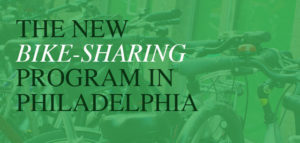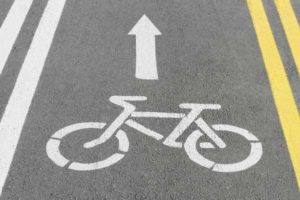 In spring of 2015, Philadelphia will be officially introduced to Indego, the city’s first bike-sharing program.[1] In the works since 2009, Indego will finally provide Philadelphia residents with an alternate form of transportation around the city, which will help fill in gaps in the mass-transit system, help to reduce auto emissions, encourage healthy living, and more.
In spring of 2015, Philadelphia will be officially introduced to Indego, the city’s first bike-sharing program.[1] In the works since 2009, Indego will finally provide Philadelphia residents with an alternate form of transportation around the city, which will help fill in gaps in the mass-transit system, help to reduce auto emissions, encourage healthy living, and more.
Chicago, Washington, Boston, and nearly 40 other cities across the United States[2]already have bike-sharing programs in place, on which the Philadelphia program will be modeled. Indego is expected to provide an estimated 60 kiosks around the city, focusing on popular neighborhoods, transit stations, cultural facilities, and other high-traffic areas. Around 600 bicycles will be available throughout the kiosks for individuals to rent and ride around the city. When you have arrived at your destination and are finished with the bike, you can simply return it to another kiosk near your ending point. Bike-sharing is also cost-effective, as Indego is expected to charge approximately $5.00 for one hour of riding. This can be cheaper than taking a cab or another form of motorized transportation. Bike-sharers will be able to pay a la carte with cash or credit cards or can purchase membership cards.
While bike-sharing has many benefits for the environment and the health of Philadelphia residents, this type of program does not exist without some concerns. For example, bike-sharing programs can increase the number of bicyclists on the roads and, therefore, increase the number of accidents and injuries to riders. The National Highway Traffic Safety Administration (NHTSA) reports[3] that, in 2012, an estimated 49,000 bicyclists suffered injuries in traffic-related accidents and an additional 726 died as a result of bicycle accident-related injuries. Bicycle accidents are already the cause of a large number of injuries, and bike-sharing may only increase the number of injuries for the following reasons and more.
Bike Sharing Programs Can Lead To More Inexperienced Riders On The Road

It stands to reason that people who regularly use bicycles to commute around Philadelphia often own their own bikes. By definition, those who ride regularly are going to be more experienced riders than those who do not. One of the issues with making bicycles easily available to anyone in the city is that it could easily result in an influx of inexperienced riders. Like any other physical skill, riding a bicycle takes practice to master and individuals who are unfamiliar with riding may put others at risk. In addition, experienced bicyclists have will usually have a better understanding of the rules of the road, making them inherently safer than bicyclists who have less experience riding in an urban area where bicyclists and motor vehicles are in close proximity to one another.
While inexperienced bicyclists clearly can pose a risk to themselves, they may also pose a risk to other bicyclists with whom they may be sharing the road or dedicated bicycle lanes. When one rider makes a mistake, it may affect other riders next to or behind him or her, potentially resulting in serious accidents. In some cases, the error of one bicyclist may even cause an accident between another bicyclist and a car or truck.
No Helmets Provided
The Johns Hopkins Injury Prevention Center[4] reports that an estimated 70 to 80 percent of bicyclists killed in accidents suffer head injuries. Additionally, research shows that wearing a helmet while riding is the single most effective method of lessening or preventing head trauma and brain injuries in bicycle accident victims. However, Indego—like the majority of bike-sharing programs across the U.S.–will not provide helmets as part of the service.
Providing helmets for riders taking part in bike-sharing programs presents many practical and health issues. First, Indego would have to have a separate station next to the kiosks to distribute helmets separately from the bicycles. However, it is highly important for a helmet to fit a rider’s head in order to fully be effective and Indego would therefore have to provide a variety of sizes in order to serve all types of riders. Additionally, many riders may have hygiene or health concerns if each helmet was not completely sanitized after each use. Lack of proper sanitation may open the company up to liability for any health issues spread by helmet sharing.
The best option is for riders to bring their own helmets if they know they are going for a ride. However, since Pennsylvania law[5] only requires helmets for bicyclists under the age of 12, most riders will likely not carry a helmet with them. Also, many people may spontaneously decide to rent a bike and the chances of them having a helmet with them are slim. The potential increase in riders without helmets may lead to increased head injuries.
Maintenance Concerns
Indego will be responsible for properly inspecting and maintaining the 600 bikes in its fleet to keep them safe for use by riders. Such maintenance may include:
- Gear lubrication
- Tire inflation
- Checking steering and braking mechanisms
- Replacing reflectors, bells, or other safety items
With so many bikes traveling around the city, it may be easy for issues on a particular bike to go unnoticed and un-repaired. If a part of a bike malfunctions while someone is riding it, they may easily lose control and crash into another vehicle, building, bicyclist, object, or anything else. Therefore, in order to limit the risk of injuries for patrons, Indego must have a very meticulous procedure for ensuring proper maintenance of the bikes.
Despite the above risks of bike-sharing, thousands of Philadelphia residents are already looking forward to the roll out of the Indego program this spring. The risk of bicycle accidents can always be reduced by safe and smart riding. Taking a bicycle skills course,[6] having the proper safety equipment, familiarizing yourself with the roads, and other tactics can help to avoid collisions and injuries and ensure that participating in bike-sharing is a positive experience. Once the weather warms up in Philadelphia, you should not hesitate to head out and take an enjoyable ride.